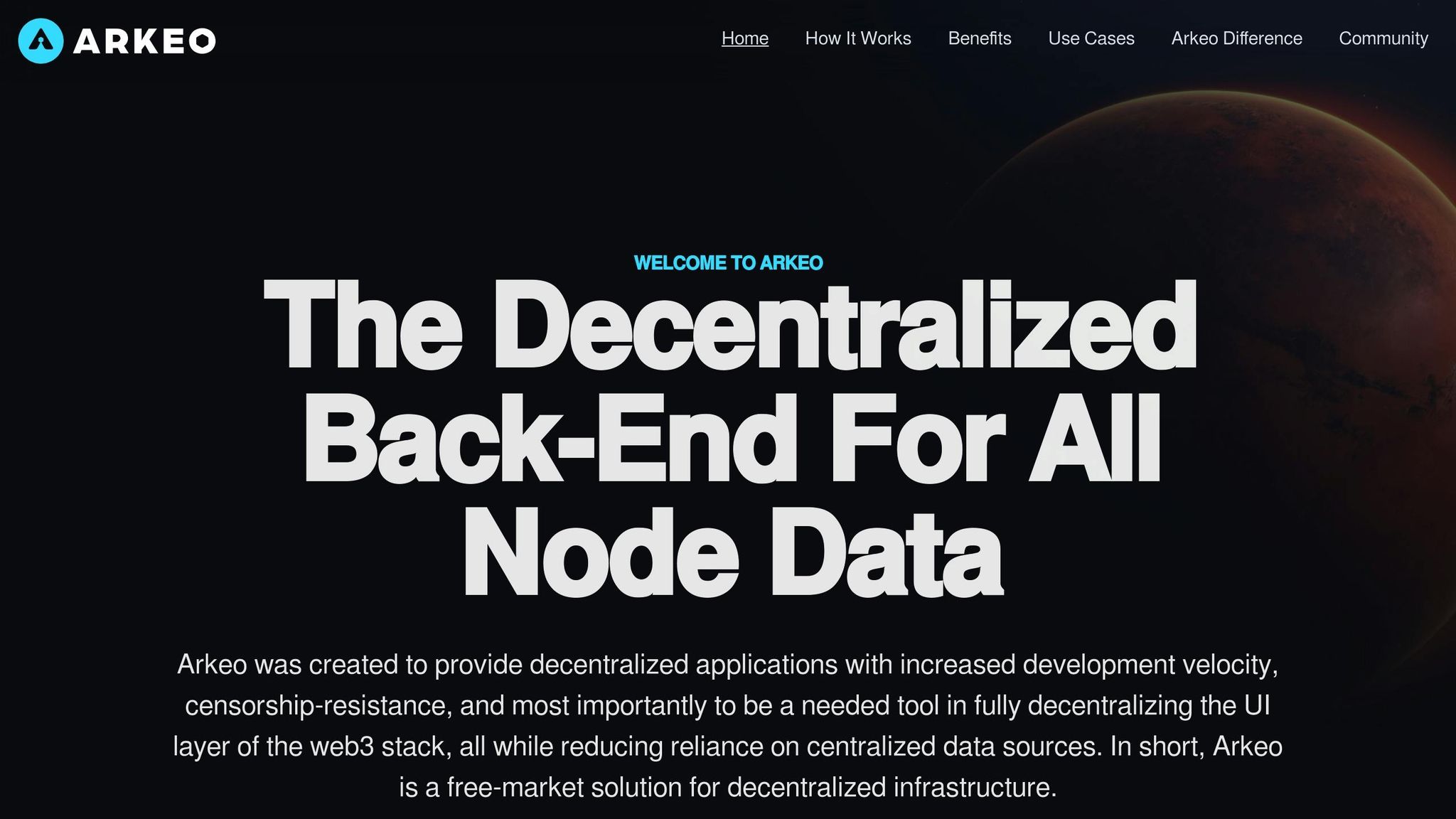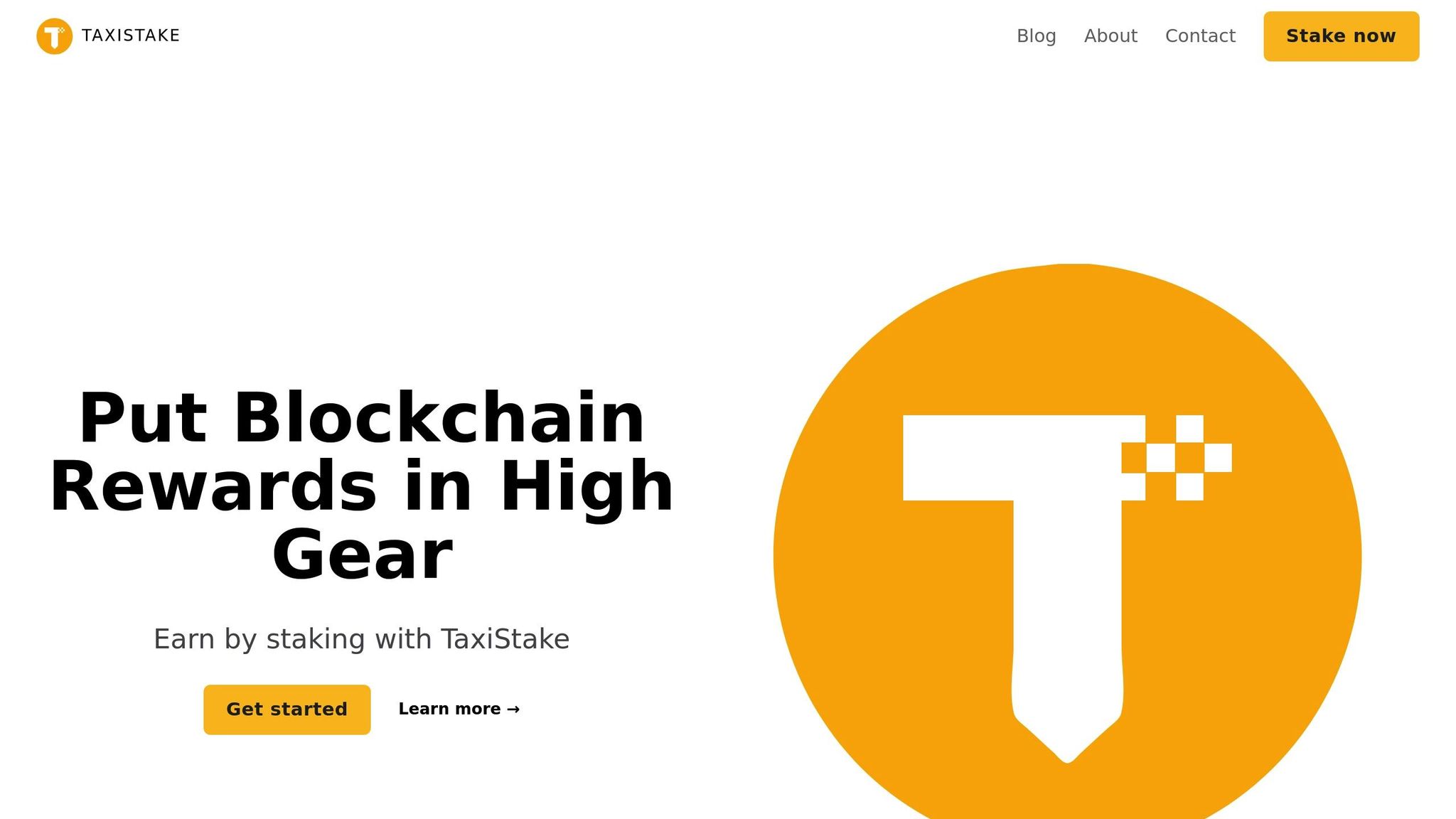Why Arkeo Validators Matter in today’s decentralized world.
Explore the crucial role of validators in decentralizing blockchain networks, enhancing security, and enabling seamless multi-chain support.
By Scott • • 5 min read

Arkeo validators are essential for creating a decentralized, secure, and censorship-resistant blockchain infrastructure. They process transactions, maintain consensus, and support a multi-chain ecosystem for Bitcoin, Ethereum, and Cosmos networks. Here's what makes them important:
- Decentralized Node Marketplace: Users can access blockchain data directly from providers without intermediaries.
- Economic Incentives: Validators earn rewards through a unique system where 10% of provider income funds block rewards.
- Censorship Resistance: The network's distributed design ensures uninterrupted access, even in restrictive regions.
- Multi-Chain Support: Arkeo enables applications to work seamlessly across blockchains.
Arkeo empowers developers and users by eliminating centralized dependencies, offering a free-market model for blockchain data access. Validators play a key role by ensuring network reliability and fostering the principles of decentralization.
What Is Arkeo Network?
Understanding Arkeo

What Does Arkeo Do
Arkeo provides a decentralized marketplace for node data, enabling users to run or access blockchain nodes without relying on centralized intermediaries [1]. This setup allows developers and users to directly connect with their chosen data hosts, cutting out the middleman.
The network operates on a free-market model where node operators set their own prices for data access. This approach encourages competition, ensuring better service quality while benefiting both providers and users. Let’s take a closer look at the system’s key components.
Main Components of Arkeo
Arkeo’s infrastructure is built using the Cosmos SDK, creating a system designed to operate smoothly and efficiently [1].
Here are the primary components of the network:
| Component | Function | Benefit |
|---|---|---|
| Full Node Operation | Allows anyone to run nodes across blockchains | Offers income opportunities for operators |
| Token Economics | Allocates 10% of provider income to reserves | Funds validator rewards and supports the network |
| Cross-Chain Support | Works with Bitcoin, Ethereum, and Cosmos chains | Enables multi-chain application development |
The network supports various types of indexed node data, making it adaptable for a range of blockchain applications. This design allows developers to create applications that can easily access data across multiple blockchain networks, fostering a more interconnected ecosystem.
Arkeo addresses a key challenge in the blockchain world by offering a decentralized solution for accessing node data. This helps build a reliable infrastructure for decentralized applications while promoting the principles of web3 independence.
Benefits of Decentralized RPC Data Providers
Network Security Improvements
Arkeo strengthens blockchain security by eliminating single points of failure. Instead of relying on centralized systems, its distributed validator network ensures the blockchain keeps running smoothly, even if some nodes face issues. Users can connect directly with their chosen data hosts, bypassing intermediary servers [1]. This setup creates a more resilient network where disruptions affect only specific areas rather than the entire system.
| Security Aspect | Traditional Model | Arkeo's Approach |
|---|---|---|
| Infrastructure | Centralized servers | Distributed validators |
| Failure Impact | Network-wide outages | Localized disruptions |
| Access Control | Single authority | Free-market system |
| Data Availability | Limited by provider | Multiple providers |
Validator Income Options
Arkeo offers steady income opportunities for validators by linking rewards to market-driven pricing [1]. Data providers can set dynamic prices, offer flexible subscription plans, and scale their operations based on market demand.
"Prior to Arkeo, only altruists were running node data (or centralized companies). By incentivizing the decentralization of this part of the stack we have a more reliable and robust layer to power decentralized applications and interfaces across web3." - Arkeo Network [1]
Protection Against Censorship
Arkeo's decentralized structure also helps combat censorship. Its distributed validator network, direct user connections, and geographic diversity ensure that blockchain access remains available, even in regions with restrictive policies [1].
"As a decentralized network, Arkeo is resistant to censorship and centralized control, providing a more secure and transparent platform for the community to utilize and contribute to." - Arkeo Network [1]
These elements work together to create a durable and decentralized blockchain ecosystem.
How Arkeo's Validation Works
Network Structure
Arkeo's validation system runs on the Cosmos SDK, leveraging interconnected validators operating blockchain nodes. This setup creates a marketplace where users can access node data at validator-set prices [1]. The system is designed to reward consistent participation and encourage network growth through performance-based incentives.
The network is also built to support multiple blockchains without complications.
Multi-Chain Support
Arkeo operates on a custom blockchain powered by the Cosmos SDK, managing a marketplace of blockchain nodes. Data is processed using "Un-chained", an open-source indexing layer [1]. The platform supports several blockchains:
| Chain Type | Operation | User Benefit |
|---|---|---|
| Bitcoin | Node Query | Direct data access at chosen prices |
| Ethereum | Node Query | Direct data access at chosen prices |
| Cosmos | Node Query | Direct data access at chosen prices |
This multi-chain approach lays the groundwork for the network's strict performance standards.
Validator Performance Rules
Validators in the network must meet strict performance requirements, much like the precise synchronization of gears in a clock. The system uses an on-chain reputation mechanism that tracks factors such as provider age, user retention, query volume, and income generation [1][2]. Strong performance helps validators build trust, ensuring users feel secure when opening contracts backed by token escrow [1]. Additionally, new blockchain nodes can be introduced through community governance decisions [1].
Getting Started with TaxiStake

TaxiStake's Network Position
TaxiStake operates as a genesis validator on Arkeo, offering a professional and secure infrastructure. Here's a breakdown of what makes it reliable:
| Component | Purpose | Benefit |
|---|---|---|
| 24/7 Monitoring | Continuous system oversight | Quick response to any network changes |
| Redundant Infrastructure | Backup systems in place | Improved uptime and reliability |
| Secure Key Management | Safeguards validator operations | Minimizes security risks |
| Professional Support | Technical expertise at hand | Simplifies the staking process |
This setup ensures a smooth and secure staking experience.
How to Stake Through TaxiStake
To get started, you'll need to participate in the April 2025 airdrop and take advantage of TaxiStake’s validator setup. Follow these steps to begin staking:
-
Initial Setup
Visit https://claim.arkeo.network/ and connect your compatible wallet to the Arkeo network. -
Token Acquisition
Claim your ARKEO tokens at https://claim.arkeo.network/. The airdrop is divided into three phases:- One-third is available immediately upon claiming.
- Another third is released after you delegate your tokens.
- The final third becomes available after participating in governance.
- Note for Ethereum Users If you’re claiming ARKEO tokens from an Ethereum address, the claim is done via a signed message and the tokens are transferred to your Arkeo address. If you're claiming natively on Arkeo, you'll receive a small amount of ARKEO at genesis to cover initial gas fees.
-
Delegation Process
To unlock the second portion of your airdrop rewards, delegate your ARKEO tokens to the TaxiStake validator. There are two ways to do this:Option 1: Manual Delegation
- Go to www.taxistake.com
- Click on the "Stake ARKEO" button
- Connect your wallet to the ping.pub explorer
- Select TaxiStake as your validator and delegate your tokens
Option 2: Autocompounding with Restake
- On www.taxistake.com, click the Restake option
- Enable secure autodelegation through the Restake app
- Your rewards will be automatically claimed and delegated twice daily
- TaxiStake will cover the fees for claiming and delegating your rewards
- Check out X for more info on the Restake app
Next Steps
Key Highlights
The Arkeo network's validation system introduces a new level of functionality for decentralized blockchain infrastructure. Here's a breakdown of its current features and potential future developments:
| Aspect | Current Status | Future Outlook |
|---|---|---|
| Network Support | Supports Bitcoin, Ethereum, and Cosmos [1] | Plans to include more assets [2] |
| Income Options | Operate full nodes with custom query pricing [1] | Expanding market for indexed node data [1] |
| Participation | Three-phase airdrop distribution [3] | Greater governance opportunities |
These features make it easier for users to join and benefit from the Arkeo network.
How to Get Started
Use these resources to begin your journey with Arkeo:
Official Resources
- Network Documentation: docs.arkeo.network
- Airdrop Portal: claim.arkeo.network
- Arkeo Website: arkeo.network
Steps to Take
- Claim Tokens: Access the first third of your airdrop allocation [3].
- Delegate Tokens: Unlock the second portion through delegation [3].
- Engage in Governance: Participate to secure the final third [3].